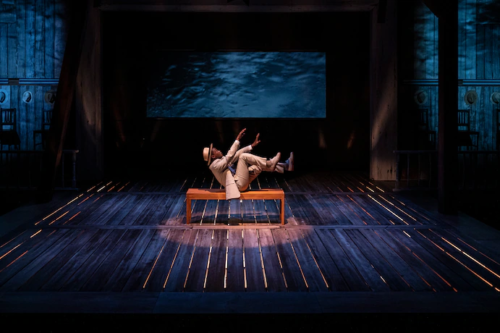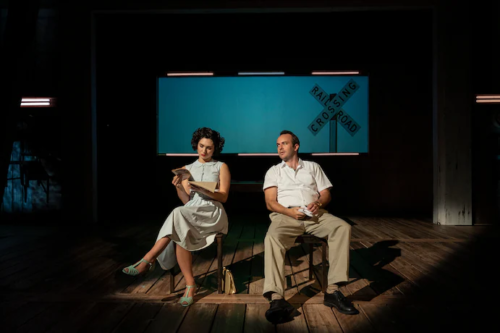Mosaic Theater Company stages all three of Ifa Bayeza’s history-based plays. The most intriguing is the second part, “Benevolence.”
Review by Celia Wren for The Washington Post.


Antonio Michael Woodard as Emmett Till in “That Summer in Sumner.” (Teresa Castracane)
In a chillingly lyrical moment in Ifa Bayeza’s play “Benevolence,” a guilty Mississippi woman sees a vision in a burning cloth. It’s 1955, and this White 20-something surely knows her husband is off killing Emmett Till, a Black 14-year-old, whom she has accused of making inappropriate advances. When a potholder catches fire while she’s making coffee, Caroline Bryant perceives the boy’s smile in the flame.
Young Emmett haunts that smoldering fabric much as he haunts this play: a presence more powerful for being literally absent. He isn’t a character in “Benevolence,” unlike in “The Ballad of Emmett Till” and “That Summer in Sumner,” the two other plays in Bayeza’s history-based “The Till Trilogy,” mounted by Mosaic Theater Company. Instead, “Benevolence” — the most intriguing of the three — knits together stories that deepen and in some ways complicate our understanding of both Till’s murder and its context.
Staged by director Talvin Wilks, and featuring marvelous performances, “Benevolence” initially spotlights Caroline Bryant (Anna Theoni DiGiovanni), her brutish husband, Roy (Scott Ward Abernethy), and one of Roy’s brothers (also Abernethy), with whom she has an affair. Thanks to time shifts, and Mona Kasra’s projections (including moths around a lightbulb), there’s an intermittent fever-dream quality to the portrait of the Bryants’ lust, boredom, narcissism and — in the men’s case — machismo.

In a symphonic development of theme, a second narrative reprises, but alters, the motif of a flawed marriage, presenting us with two Black Mississippians, Beulah and Clinton Melton (Billie Krishawn and Vaughn Ryan Midder), estranged in 1955. It’s a wrenchingly sad story, but Bayeza folds in rich comic relief, through a precocious 9-year-old neighbor (a very funny Rolonda Watts) who talks Clinton’s ear off.

Humor also buoys “Summer,” a splendidly acted and mostly engrossing world premiere that draws on courtroom transcripts and other primary sources to chronicle the trial and acquittal of Till’s accused killers. (In a program note, Bayeza notes that the trilogy employs some dramatic license, including certain composite characters.)
Protagonists include the members of the Black press whose coverage helped make Till’s murder an inflection point in American history. Notwithstanding personal danger, and the harrowing events they’re covering, Jet magazine photographer David “Jax” Jackson (Midder), Ebony journalist Clotye Murdock (Watts, radiating dry wit) and Johnson Publications reporter Simeon Booker (Jaysen Wright) maintain a bantering camaraderie — think “The Front Page,” but with more dread.
At the same time, trial scenes — and a frantic search for additional witnesses to Till’s abduction and killing — create considerable suspense. Not that courtroom-drama pleasures risk eclipsing the play’s broader vista, what with the anguish of Till’s mother (Krishawn, all aching grace) and great uncle (Jason Bowen), and the undisguised bigotry of local authorities, including the sheriff (Chris Genebach). And for audiences who see more than one of these plays, an awareness of recurring characters and performances, and the starkness of Andrew Cohen’s anchoring wooden set, add a sense of unflinching contemplation of bitter facts.
Young Emmett (Antonio Michael Woodard) does show up in “Summer,” as a figure whose ebullient chattiness — as in “Ballad” — usurps too much dramaturgical focus. Giving a vibrant voice to Till, in real life silenced so young, is worthy. But it’s a shame when the character’s verbosity distracts from the trilogy’s other achievements: history rendered with immediacy, with tones and perspectives sometimes engagingly varied. Vivid snapshots, and yet panorama.
The Ballad of Emmett Till, That Summer in Sumner and Benevolence, by Ifa Bayeza. Directed by Talvin Wilks. Lighting, Alberto Segarra; costumes, Danielle Preston; sound and music, Kwamina “Binnie” Biney. “Ballad’: About 1 hour 50 minutes, through Nov. 19. “Summer”: About 2 hours 45 minutes, through Nov. 20. “Benevolence”: About 2 hours 15 minutes, through Nov. 19. Part of “The Till Trilogy” at Atlas Performing Arts Center, 1333 H St. NE. mosaictheater.org.